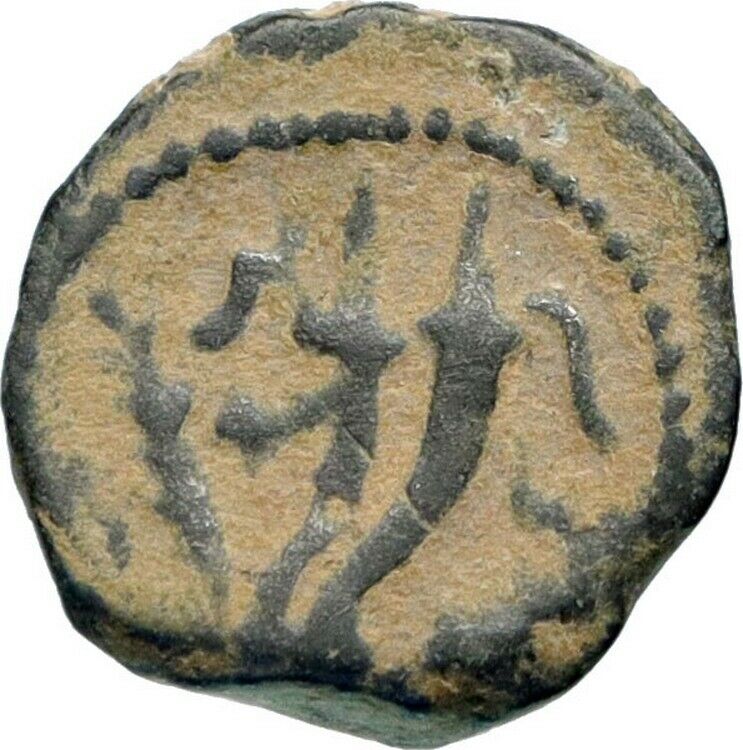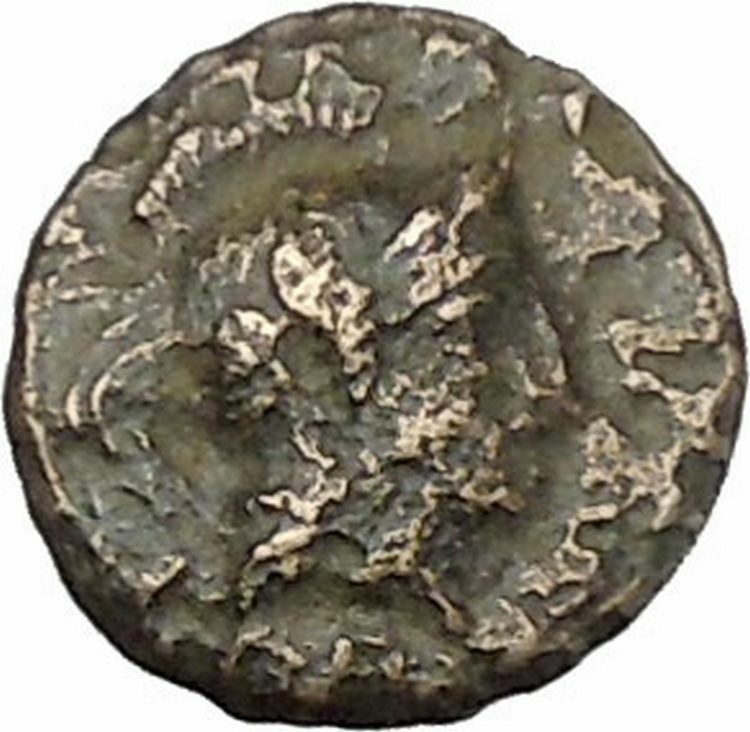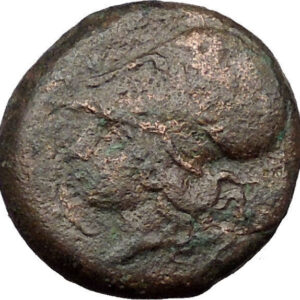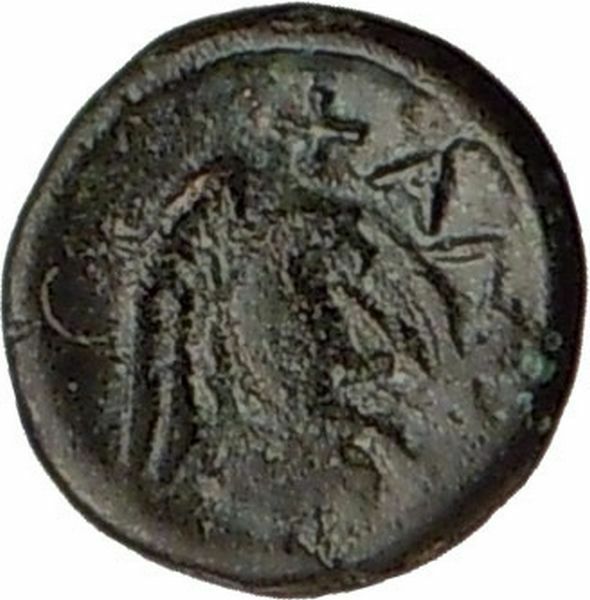|
Greek coin of the Kingdom of Macedonia
Kassander – Macedonian King: 319-297 B.C.
Bronze 17mm (4.45 grams) Struck circa 319-297 B.C.
Reference: Sear 6755; Forrer/Weber 2162
Laureate head of Apollo right.
ΒΑΣΙΛΕΩΣ / KAΣΣAΝΔΡΟΥ either side of tripod.
The son of Antipater, Regent of Macedon appointed by Alexander, Kassander succeeded to the government of the country of his father’s death in 319 B.C. He was notorious for his cruelty, and in 311 B.C. he executed Alexander’s widow Roxana and her young son Alexander IV. In 305 B.C. he assumed the title of King.
You are bidding on the exact item pictured, provided with a Certificate of Authenticity and Lifetime Guarantee of Authenticity.
 In Greek and Roman mythology, Apollo, is one of the most important and diverse of the Olympian deities. The ideal of the kouros (a beardless youth), Apollo has been variously recognized as a god of light and the sun; truth and prophecy; archery; medicine and healing; music, poetry, and the arts; and more. Apollo is the son of Zeus and Leto, and has a twin sister, the chaste huntress Artemis. Apollo is known in Greek-influenced Etruscan mythology as Apulu. Apollo was worshiped in both ancient Greek and Roman religion, as well as in the modern Greco–Roman Neopaganism. In Greek and Roman mythology, Apollo, is one of the most important and diverse of the Olympian deities. The ideal of the kouros (a beardless youth), Apollo has been variously recognized as a god of light and the sun; truth and prophecy; archery; medicine and healing; music, poetry, and the arts; and more. Apollo is the son of Zeus and Leto, and has a twin sister, the chaste huntress Artemis. Apollo is known in Greek-influenced Etruscan mythology as Apulu. Apollo was worshiped in both ancient Greek and Roman religion, as well as in the modern Greco–Roman Neopaganism.
As the patron of Delphi (Pythian Apollo), Apollo was an oracular god — the prophetic deity of the Delphic Oracle. Medicine and healing were associated with Apollo, whether through the god himself or mediated through his son Asclepius, yet Apollo was also seen as a god who could bring ill-health and deadly plague as well as one who had the ability to cure. Amongst the god’s custodial charges, Apollo became associated with dominion over colonists, and as the patron defender of herds and flocks. As the leader of the Muses (Apollon Musagetes) and director of their choir, Apollo functioned as the patron god of music and poetry. Hermes created the lyre for him, and the instrument became a common attribute of Apollo. Hymns sung to Apollo were called paeans.
In Hellenistic times, especially during the third century BCE, as Apollo Helios he became identified among Greeks with Helios, god of the sun, and his sister Artemis similarly equated with Selene, goddess of the moon. In Latin texts, on the other hand, Joseph Fontenrose declared himself unable to find any conflation of Apollo with Sol among the Augustan poets of the first century, not even in the conjurations of Aeneas and Latinus in Aeneid XII (161–215). Apollo and Helios/Sol remained separate beings in literary and mythological texts until the third century CE.
A sacrificial tripod was a type of altar used by the ancient Greeks. The most famous was the Delphic tripod, on which the Pythian priestess took her seat to deliver the oracles of the deity. The seat was formed by a circular slab on the top of the tripod, on which a branch of laurel was deposited when it was unoccupied by the priestess. In this sense, by Classical times the tripod was sacred to Apollo. The mytheme of Heracles contesting with Apollo for the tripod appears in vase-paintings older than the oldest written literature. The oracle originally may have been related to the primal deity, the Earth.
Another well-known tripod was the Plataean Tripod, made from a tenth part of the spoils taken from the Persian army after the Battle of Plataea. This consisted of a golden basin, supported by a bronze serpent with three heads (or three serpents intertwined), with a list of the states that had taken part in the war inscribed on the coils of the serpent. The golden bowl was carried off by the Phocians during the Third Sacred War; the stand was removed by the emperor Constantine to Constantinople (modern Istanbul), where it still can be seen in the hippodrome, the Atmeydanı, although in damaged condition, the heads of the serpents disappeared however one is now on display at the nearby Istanbul Archaeology Museums. The inscription, however, has been restored almost entirely. Such tripods usually had three ears (rings which served as handles) and frequently had a central upright as support in addition to the three legs.
Tripods frequently are mentioned by Homer as prizes in athletic games and as complimentary gifts; in later times, highly decorated and bearing inscriptions, they served the same purpose. They also were used as dedicatory offerings to the deities, and in the dramatic contests at the Dionysia the victorious choregus (a wealthy citizen who bore the expense of equipping and training the chorus) received a crown and a tripod. He would either dedicate the tripod to some deity or set it upon the top of a marble structure erected in the form of a small circular temple in a street in Athens, called the street of tripods, from the large number of memorials of this kind. One of these, the Choragic Monument of Lysicrates, erected by him to commemorate his victory in a dramatic contest in 335 BC, still stands. The form of the victory tripod, now missing from the top of the Lysicrates monument, has been rendered variously by scholars since the eighteenth century.
The scholar Martin L. West writes that the sibyl at Delphi shows many traits of shamanistic practices, likely inherited or influenced from Central Asian practices. He cites her sitting in a cauldron on a tripod, while making her prophecies, her being in an ecstatic trance state, similar to shamans, and her utterings, unintelligible.
According to Herodotus (The Histories, I.144), the victory tripods were not to be taken from the temple sanctuary precinct, but left there for dedication.
Cassander (Greek: Κάσσανδρος , Kassandros Antipatros; ca. 350 – 297 BC), King of Macedonia (305 – 297 BC), was a son of Antipater, and founder of the Antipatrid dynasty.
Early history
Cassander is first recorded as arriving at Alexander the Great’s court in Babylon in 323 BC, where he had been sent by his father, Antipater, likely to help uphold Antipater’s regency in Macedon, although a later contemporary suggestion hostile to the Antipatrids was that Cassander had journeyed to poison the King.
Whatever the truth of this suggestion, Cassander certainly proved to be singularly noted amongst the diadochi in his hostility to Alexander‘s memory. Alexander IV, Roxanne, and Alexander’s supposed illegitimate son Heracles would all be executed on his orders, and a guarantee to Olympias to spare her life was not respected. So too, Cassander would restore Thebes, which had been destroyed under Alexander. This gesture was perceived at the time to be a snub to the deceased King. It was even said that he could not pass a statue of Alexander without feeling faint. Cassander has been perceived to be ambitious and unscrupulous, and even members of his own family were estranged from him.
Later history
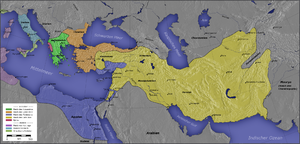
Kingdom of Cassander Other diadochi Kingdom of Seleucus Kingdom of Lysimachus Kingdom of Ptolemy Epirus Other Carthage Rome Greek colonies
As Antipater grew close to death in 319 BC, he transferred the regency of Macedon not to Cassander, but to Polyperchon, possibly so as not to alarm the other diadochi through an apparent move towards dynastic ambition, but perhaps also because of Cassander’s own ambitions. Cassander rejected his father’s decision, and immediately went to court Antigonus, Ptolemy and Lysimachus as allies. Waging war on Polyperchon, Cassander would destroy his fleet, put Athens under the control of Demetrius of Phaleron, and declare himself Regent in 317 BC. After Olympias’ successful move against Philip III later in the year, Cassander would besiege her in Pydna. When the city fell two years later, Olympias was killed, and Cassander would have Alexander IV and Roxanne confined at Amphipolis.
Cassander associated himself with the Argead dynasty by marrying Alexander’s half-sister, Thessalonica, and had Alexander IV and Roxanne executed in either 310 BC or the following year. Certainly, in 309, Polyperchon would begin forwarding the claims of Heracles as the true heir to the Macedonian inheritance, at which point Cassander bribed him to have the boy killed. After this, Cassander’s position in Greece and Macedonia was reasonably secure, and he would proclaim himself King in 305 BC. After the Battle of Ipsus in 301 BC, in which Antigonus was killed, he was undisputed in his control of Macedonia. However, he had little time to savour the fact, dying of dropsy in 297 BC.
Cassander’s dynasty did not live much beyond his death, with his son Philip dying of natural causes, and his other sons Alexander and Antipater becoming involved in a destructive dynastic struggle along with their mother. When Alexander was ousted as joint king by his brother, Demetrius I took up Alexander’s appeal for aid and ousted Antipater, killed Alexander, and established the Antigonid dynasty. The remaining Antipatrids such as Antipater Etesias would prove unable to re-establish the Antipatrids on the throne.
Of more lasting significance was Cassander’s transformation of Therma into Thessalonica, naming the city after his wife. Cassander also founded Cassandreia upon the ruins of Potidaea.
Cassander as a fictional character
-
Mary Renault refers to Cassander in the Alexander Trilogy by his Greek name, Kassandros, and depicts him highly negatively. In Funeral Games, he is the villain of the piece.
-
In the Oliver Stone film Alexander, he is portrayed by Jonathan Rhys Meyers.
|





 In Greek and Roman mythology, Apollo, is one of the most important and diverse of the Olympian deities. The ideal of the kouros (a beardless youth), Apollo has been variously recognized as a god of light and the sun; truth and prophecy; archery; medicine and healing; music, poetry, and the arts; and more. Apollo is the son of Zeus and Leto, and has a twin sister, the chaste huntress Artemis. Apollo is known in Greek-influenced Etruscan mythology as Apulu. Apollo was worshiped in both ancient Greek and Roman religion, as well as in the modern Greco–Roman Neopaganism.
In Greek and Roman mythology, Apollo, is one of the most important and diverse of the Olympian deities. The ideal of the kouros (a beardless youth), Apollo has been variously recognized as a god of light and the sun; truth and prophecy; archery; medicine and healing; music, poetry, and the arts; and more. Apollo is the son of Zeus and Leto, and has a twin sister, the chaste huntress Artemis. Apollo is known in Greek-influenced Etruscan mythology as Apulu. Apollo was worshiped in both ancient Greek and Roman religion, as well as in the modern Greco–Roman Neopaganism.


